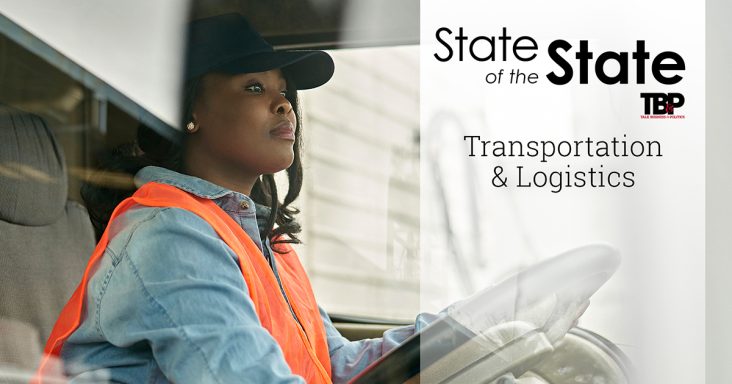State of the State 2024: Freight recession might not end until later this year, 2025
by February 2, 2024 4:08 pm 2,362 views

Editor’s note: The State of the State series provides reports twice a year on Arkansas’ key economic sectors. The series publishes stories to begin a year and stories in July/August to provide a broad mid-year update on the state’s economy. Link here for the State of the State page and previous stories.
Executives in the trucking/transportation and logistics industry look forward to a freight volume recovery, but it might be modest and slow, coming in the back half of the year or 2025. The market softness has pressured an industry challenged to cover rising costs.
Shannon Newton, president of the Arkansas Trucking Association, said the economic challenges and uncertainty carriers faced in 2023 eclipsed issues, like shaping regulatory and legislative policy and public image. Carriers focused on remaining in business and maintaining their customers and employees.
“Our industry’s costs have remained high, and the demand is not there to make up for those costs,” Newton said. The rising cost of insurance, equipment and labor are ongoing challenges.
Newton is cautiously optimistic about 2024 after 2023 ended like it started. “We pretty much anticipated that it was going to be rocky throughout the year, and it was,” she said. “I think there is a little bit more optimism that, by the end of 2024, the trajectory will be more consistently upward.”
Asked about 2023 highlights, she pointed to the resiliency of small to mid-sized carriers that have weathered the tough economic conditions for a long period. She hopes they will be in a position “to reap the benefits of any forthcoming recovery.” Other highlights included the attention to the workforce and changes that have lowered the barriers to joining the industry, such as access to veterans or streamlining the commercial driver’s license (CDL) process.
In Arkansas, she said legislation has improved the availability of funding for career and technical education. Also, a potential constitutional amendment would allow lottery scholarships to be used for vocational training. She added that the new income tax rates in Arkansas are a welcome relief amid the challenges carriers have faced over the past year.
Newton explained that the pace at which new energy and environmental regulations will go into effect in California has been surprising, and she is concerned this won’t be seen as an issue here. Arkansas carriers operate in interstate commerce and will be affected by those changes.
“Those unrealistic EPA standards and regulatory actions that are being allowed in that state — that’s creating a patchwork that’s different there than other states — is a major concern,” she said. “I can rattle off three or four different meetings that took place in Arkansas in 2023 educating our members and talking about the challenges of traveling in and out of the state of California to service their customers.”
Newton said a “political stalemate” and lack of federal action in Washington has pushed a lot of issues to states to handle, such as the California regulations, lawsuit abuse, towing and recovery, and cargo theft challenges. In Arkansas, she said truck parking and towing reform will be key policy initiatives in 2024.
Kevin Williamson, CEO of Chicago-based RJW Logistics Group, said 2023 started with a false hope the transportation industry wouldn’t slide into a recession. But throughout the year and into the holiday shipping season, or peak season, freight demand fell and capacity was loose. RJW Logistics Group, which has a Bentonville office, provides transportation and warehousing services for consumer packaged goods (CPG) companies.
“I was surprised at the fourth quarter and how we didn’t see a blip in demand,” he said. “It’s the softest that I’ve seen a fourth quarter in decades, which tells me that we’re in no way recovering from a logistics and transportation slowdown.”
Williamson said less-than-truckload (LTL) carrier Yellow went out of business last year, and other LTL fleets absorbed the freight volumes Yellow had handled. Those carriers saw an earnings bump following the Yellow closure and have been considering whether to raise rates as truckload rates remain flat.
“We’ll see if that comes to fruition and if Yellow’s demise ate up enough capacity of the current providers to sustain a GRI (general rate increase) or if certain LTL carriers will not do the GRI and gain market share,” he said.
Still, he expects the soft market trend to continue and doesn’t expect a recovery from the freight recession this year.
“We’ll probably see a little bit better in the fourth quarter of 2024,” added Williamson, who projected an industry recovery by mid-2025. “I’m not holding my breath thinking that we’re going to see it in 2024.”
Williamson, who said he’s not an economist, has conversations with more than 800 CPG companies and noted that RJW Logistics Group monitors CPG order volumes. He said third-quarter orders declined by a “much larger” amount than in the same period in previous years.
He anticipates CPG orders to steadily rise in the coming quarters, but this won’t be enough to pull the industry out of a freight recession.
“I anticipate 2024 to be flat, with no recovery in the first three quarters,” he said. “A glimpse of recovery in the fourth quarter, and that’s the soonest.”
